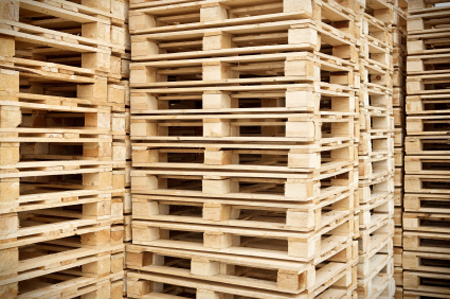Wood pallets are the foundation of global shipping and logistics, silently transporting billions of pounds of products each day. However, not all pallets are created equal; the type of timber used has an impact on everything from cost and sustainability to strength and durability. Understanding the timbers that produce the most effective pallets is crucial for selecting the appropriate product for your business requirements, regardless of whether you are in the manufacturing, warehousing, or transport industries.
The Fundamentals of Hardwoods and Softwoods
Wood is typically classified into two categories: hardwood and softwood when it comes to pallet production.
The denser and more durable hardwoods, such as oak or maple, are derived from deciduous trees. They are optimal for heavy-duty or export applications in which palettes must bear substantial weight.
Softwoods, such as pine or spruce, are derived from coniferous trees and are more lightweight and convenient to work with. They are frequently employed for standard shipping pallets due to their ability to reconcile functionality with cost.
Depending on the client’s needs, the availability of lumber, and cost considerations, numerous pallet manufacturers employ both varieties.
Top Woods Employed in Pallet Manufacturing
1. Southern Yellow Pine
In the United States, Southern Yellow Pine (SYP) is one of the most frequently used softwoods for pallets. It is readily accessible, cost-effective, and boasts an exceptional strength-to-weight ratio. Pine is also readily amenable to treatment, rendering it an optimal choice for heat-treated containers that are necessary for international shipping (ISPM 15 compliance). It is an excellent option for short-term transport and lightweight cargo.
2. Oak
Oak is one of the most durable and robust hardwoods that can be used for pallet construction. It is frequently employed in industries such as heavy manufacturing, steel, and automotive, where burdens can exceed 3,000 pounds, or for reusable pallets. Oak pallets are more costly and heavier than pine, but they can endure for years with appropriate maintenance.
3. Maple
Maple wood is another hardwood that is frequently employed in the production of high-performance pallets. It is the optimal choice for warehouse environments that involve the frequent handling of pallets by forklifts, as it offers exceptional impact resistance and a consistent texture. Maple pallets have a longer longevity than many softwoods, as they are resistant to cracking and splitting.
4. Poplar
Poplar provides a harmonious blend of hardwood and softwood attributes. It is more lightweight and simpler to process than oak or maple, yet it still offers sufficient strength for medium-duty burdens. The smooth surface of poplar is a popular choice for palettes used in manufacturing and distribution centers, as it reduces splintering.
5. Spruce and Fir
Spruce and fir are softwoods that are extensively employed in the western United States. These species are both lightweight and durable, rendering them ideal for disposable pallets or one-way shipping. Their low moisture content is crucial for companies that transport products in humid or variable climates, as it mitigates mold and warping.
Factors That Influence the Most Effective Wood Selection
- Load Requirements: Dense hardwoods, such as oak or maple, are necessary for heavy products. Pine or fir can substitute for lesser loads.
- Budget: Softwoods are more cost-effective and are well-suited for single-use pallets.
- Humidity and Climate: Kiln-dried timbers are most effective in humid environments.
- Needs for Regulation: In order to comply with ISPM 15 standards, exporters are required to utilize heat-treated or fumigated wood.
- Sustainability: A significant number of pallet companies recycle and repair used pallets, thereby fostering sustainable forestry practices and reducing waste.
Recycled Pallet Alternatives
The environmental benefits and cost savings of recycled wood pallets are driving their increasing popularity. Companies reduce waste and extend the lifespan of high-quality lumber by refurbishing existing pallets. The most desirable qualities of affordability and durability are frequently combined in recycled hardwood pallets.
Concluding Thoughts
The optimal timber for pallets is contingent upon the specific requirements of your business, including the frequency of pallet reuse and the weight of your products. Hardwoods, such as oak and maple, offer unparalleled durability, while softwoods, such as pine and spruce, offer cost-effective adaptability. Working with a dependable pallet supplier guarantees consistent quality, proper treatment, and sustainability throughout your supply chain, regardless of your preference.
Get a hold of AAA Pallet & Lumber Co., for all of your pallet needs, we sell new and new pallets, export pallets, and can even recycle your used pallets. Call us at 602-278-1450 for more information.





